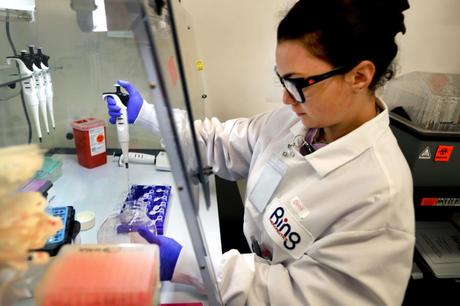
IImagine a world where everything from plastic to concrete is produced from biomass. Personalized cell and gene therapies prevent pandemics and treat previously incurable genetic diseases. Meat is grown in the laboratory; improved food pellets are climate resistant. This is what the future could look like in the coming years.
The next big revolution that will change the game is in biology. It will allow us to fight diseases more effectively, feed the planet, generate energy and sequester carbon. We are already on the cusp of these opportunities. Last year saw some major milestones: the US approved the production and sale of laboratory meat for the first time; Google DeepMind's AI predicted structures of more than 2 million new materials, which could potentially be used for chips and batteries; Casgevy became the first approved commercial gene editing treatment using CRISPR. If I were young today, biology would truly be one of the most fascinating things to study.
Like the digital revolution, the biotech revolution is poised to transform the American economy as we know it - and it's coming sooner than we expect, powered by AI. Recent developments in biotechnology are unlocking our ability to program biology, just as we program computers. Just as OpenAI's ChatGPT trains on human language input to come up with new text, AI models trained on biological sequences can design new proteins, predict cancer growth, and create other useful consumables. In the future, AI will be able to help us conduct millions of theoretical and actual biological experiments, allowing outcomes to be predicted more accurately without laborious trial and error, greatly accelerating the number of new discoveries.
We are now on the cusp of a "ChatGPT moment" in biology, with significant technological innovation and widespread adoption on the horizon. But how willing is America to do what it takes to bring this to fruition? I am incredibly excited about this coming breakthrough moment, but it is of utmost importance to ensure that this happens on our coasts. That's why I serve on the National Security Commission on Emerging Biotechnology. As the Commission recently wrote in its recent interim report, "Continued U.S. leadership in biotechnology development is not guaranteed."
The story continues
America has a history of being a pioneer in an emerging industry before losing its leadership when it outsourced its manufacturing to other parts of the world. This pattern has been repeated in high-tech sectors such as passenger cars, consumer electronics, solar panels and especially semiconductors. To avoid the same mistake, it is critical that we secure a reliable supply chain both domestically and internationally that covers everything from raw material extraction to data storage, while building the necessary talent pipeline. Relying on other countries for key parts of biotechnology poses enormous economic and national security risks. For example, leaving our genetic information in the hands of our adversaries could help them develop a bioweapon used to target a specific genetic profile. President Biden's recent executive order aims to prevent the sale of such sensitive personal data to China and other hostile countries.
An investment in both human capital and physical infrastructure will be critical to continued U.S. leadership in biotechnology. Such investments do not have to come solely from the government, but must also provide incentives to spur more private financing, as the CHIPS and Science Act has done. It cannot be overestimated how important the bioeconomy will be to American growth over the next fifty years. Currently, the bioeconomy generates at least 5% of US GDP; By comparison, semiconductors represent only about 1% of US GDP. By some measures, 60% of the physical input to the global economy could be grown using organic processes. The promise of biology is enormous for tackling some of humanity's greatest challenges, including climate change.
As AI increases our ability to engineer biology, we will need guardrails. While it's easy to imagine doomsday scenarios in which lone wolf amateurs build a bioweapon from scratch from home, studies from Rand Corporation and OpenAI have argued that current major language models like ChatGPT do not significantly increase the risk of creating a biological threat . because they do not provide new information beyond what is already on the Internet. And it's also important to keep in mind that just because an AI model can design new pathogens doesn't mean users have the safe wet-lab infrastructure and resources to create them.
Nevertheless, the biorisk landscape is constantly evolving as the accessibility and ease of use of AI tools improves. Soon, more complex base models could provide malicious actors with more data, scientific expertise, and experiment-solving skills, suggesting candidate biological agents and helping them order biological parts from a diverse range of suppliers to evade screening protocols .
Organizations like the Federation of American Scientists and the Nuclear Threat Initiative have recommended structured red-teaming - actively looking for vulnerabilities to preemptively secure our biosafety infrastructure - for current DNA sequence screening methods and evaluating the biological capabilities of AI tools . More than 90 scientists have just signed a call to ensure AI develops responsibly in the field of protein design. We need both standards for the development and requirements for the implementation of risk assessments, as well as collaboration between the public-private sector in creating a robust testing economy.
By now, most of us have probably eaten, handled, or worn a product made with biotech. Soon, technology will disrupt every sector and fundamentally reshape our ordinary lives: new fertility treatments will transform parenting; cellular reprogramming could reverse the aging process; biocomputing will power the computers of tomorrow. As we stand on the cusp of these innovations, we as a country have a unique opportunity to determine how biotechnology unfolds, realize its immense benefits, and shape the standards for responsible innovation - before other countries race ahead.
Contact us at [email protected].
